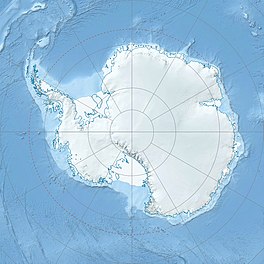| Marla Glacier | |
|---|---|
 | |
| Location | Trinity Peninsula |
| Coordinates | 64°00′30″S 58°53′00″W / 64.00833°S 58.88333°W / -64.00833; -58.88333 (Marla Glacier') |
| Length | 8 nmi (15 km; 9 mi) |
| Width | 1 nmi (2 km; 1 mi) |
| Terminus | Prince Gustav Channel |
Marla Glacier (64°00′30″S 58°53′00″W / 64.00833°S 58.88333°W / -64.00833; -58.88333 (Marla Glacier)) is a glacier 8 nautical miles (15 km; 9.2 mi) long and 1 nautical mile (1.9 km; 1.2 mi) wide on the northeast side of Detroit Plateau on the southern Trinity Peninsula in Graham Land, Antarctica.
Location

Marla Glacier is in Graham Land on the southeast coast of the Trinity Peninsula, which forms the tip of the Antarctic Peninsula. It is situated south of Aitkenhead Glacier and north of Diplock Glacier. It drains southeastwards along the east slopes of Povien Peak, then turns east between Mount Roberts and Bezenšek Spur, and flows into Prince Gustav Channel in Weddell Sea.
Name
Marla Glacier glacier is named after Marla River in Northern Bulgaria.
Nearby features
Download coordinates as:
Simpson Nunatak
63°58′S 58°54′W / 63.967°S 58.900°W / -63.967; -58.900. A nunatak, 1,165 metres (3,822 ft) high, rising 2.5 nautical miles (4.6 km; 2.9 mi) northwest of Mount Roberts, on the south margin of Aitkenhead Glacier. Named by the UK Antarctic Place-Names Committee (UK-APC) for Hugh W. Simpson of the Falkland Islands Dependencies Survey (FIDS), a member of the Detroit Plateau reconnaissance party from Hope Bay in 1957.
Povien Peak
63°58′56″S 58°58′12″W / 63.98222°S 58.97000°W / -63.98222; -58.97000. An ice-covered peak rising to 1,455 metres (4,774 ft) high in the northeast foothills of Detroit Plateau. Situated between the upper courses of Marla and Diplock Glaciers, 9.48 kilometres (5.89 mi) southwest of Mancho Buttress and, 7.3 kilometres (4.5 mi) west-northwest of Mount Roberts. Bezenšek Spur projects east-southeastwards from the peak. Named after the settlement of Povien in Southern Bulgaria.
Bezenšek Spur
64°01′15″S 58°52′00″W / 64.02083°S 58.86667°W / -64.02083; -58.86667. A 5.5 kilometres (3.4 mi) long and 665 metres (2,182 ft) high wide rocky ridge rising to 900 metres (3,000 ft) high in the northeast foothills of Detroit Plateau. It projects from the southeast side of Povien Peak eastwards between Marla Glacier and Diplock Glacier. Named after the Slovene-Bulgarian linguist Anton Bezenšek (1854-1915) who developed the stenographic system for the Bulgarian language.
References
- ^ Marla Glacier SCAR.
- Trinity Peninsula AG and BAS.
- Graham Land and South Shetland BAS.
- Alberts 1995, p. 676.
- Antarctic REMA Explorer, 63°58′56″S 58°58′12″W.
- Povien Peak SCAR.
- Antarctic REMA Explorer, 64°01′15″S 58°52′00″W.
- Bezenšek Spur SCAR.
Sources
- Alberts, Fred G., ed. (1995), Geographic Names of the Antarctic (PDF) (2 ed.), United States Board on Geographic Names, retrieved 2023-12-03
 This article incorporates public domain material from websites or documents of the United States Board on Geographic Names.
This article incorporates public domain material from websites or documents of the United States Board on Geographic Names.
| REMA Explorer |
|---|
The Reference Elevation Model of Antarctica (REMA) gives ice surface measurements of most of the continent. When a feature is ice-covered, the ice surface will differ from the underlying rock surface and will change over time. To see ice surface contours and elevation of a feature as of the last REMA update,
|
- Antarctic REMA Explorer (Digital Elevation Models created by the Polar Geospatial Center from Maxar imagery), Polar Geospatial Center, University of Minnesota, 2019, retrieved 2024-06-03
- "Bezenšek Spur", Composite Gazetteer of Antarctica, Scientific Committee on Antarctic Research
- Graham Land and South Shetland Islands, BAS: British Antarctic Survey, 2005, retrieved 2024-05-03
- "Marla Glacier", Composite Gazetteer of Antarctica, Scientific Committee on Antarctic Research
- "Povien Peak", Composite Gazetteer of Antarctica, Scientific Committee on Antarctic Research
- Trinity Peninsula (PDF) (Scale 1:250000 topographic map No. 5697), Institut für Angewandte Geodäsie and British Antarctic Survey, 1996, archived from the original (PDF) on 23 September 2015
![]() This article incorporates public domain material from websites or documents of the United States Geological Survey.
This article incorporates public domain material from websites or documents of the United States Geological Survey.
This article includes information from the Antarctic Place-names Commission of Bulgaria which is used with permission.
| Glaciers of the Trinity Peninsula and Graham Land |
|---|